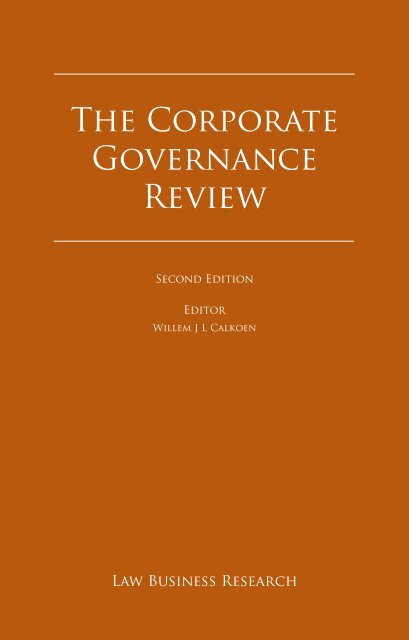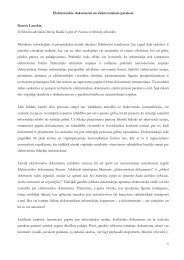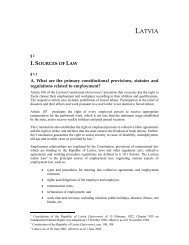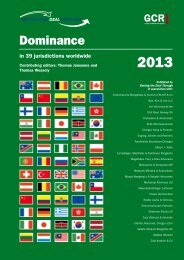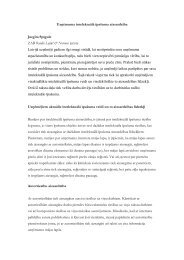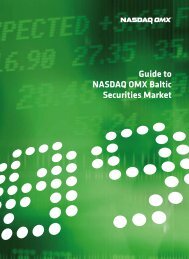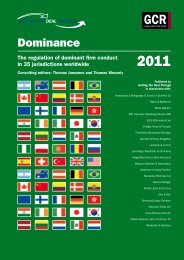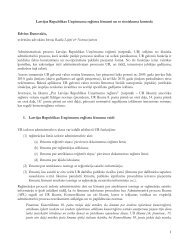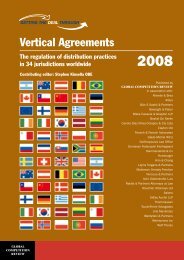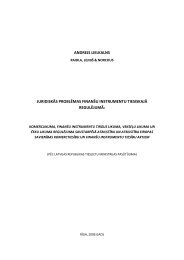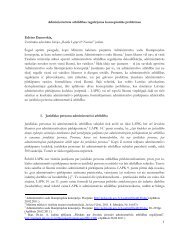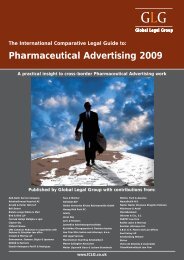Law Business Research. The Corporate Governance Review 2012 ...
Law Business Research. The Corporate Governance Review 2012 ...
Law Business Research. The Corporate Governance Review 2012 ...
Create successful ePaper yourself
Turn your PDF publications into a flip-book with our unique Google optimized e-Paper software.
<strong>The</strong> <strong>Corporate</strong><br />
<strong>Governance</strong><br />
<strong>Review</strong><br />
Second Edition<br />
Editor<br />
Willem J L Calkoen<br />
<strong>Law</strong> <strong>Business</strong> <strong>Research</strong>
<strong>The</strong> <strong>Corporate</strong> <strong>Governance</strong> <strong>Review</strong><br />
Reproduced with permission from <strong>Law</strong> <strong>Business</strong> <strong>Research</strong> Ltd.<br />
This article was first published in <strong>The</strong> <strong>Corporate</strong> <strong>Governance</strong> <strong>Review</strong>, 2nd edition<br />
(published in May <strong>2012</strong> – editor Willem J L Calkoen).<br />
For further information please email<br />
Adam.Sargent@lbresearch.com<br />
2
<strong>The</strong> <strong>Corporate</strong><br />
<strong>Governance</strong><br />
<strong>Review</strong><br />
Second Edition<br />
Editor<br />
Willem J L Calkoen<br />
<strong>Law</strong> <strong>Business</strong> <strong>Research</strong> Ltd
Publisher<br />
Gideon Roberton<br />
business development manager<br />
Adam Sargent<br />
MARKETING managers<br />
Nick Barette, Katherine Jablonowska<br />
marketing assistant<br />
Robin Andrews<br />
editorial assistant<br />
Lydia Gerges<br />
production manager<br />
Adam Myers<br />
production editor<br />
Anne Borthwick<br />
subeditor<br />
Charlotte Stretch<br />
editor-in-chief<br />
Callum Campbell<br />
managing director<br />
Richard Davey<br />
Published in the United Kingdom<br />
by <strong>Law</strong> <strong>Business</strong> <strong>Research</strong> Ltd, London<br />
87 Lancaster Road, London, W11 1QQ, UK<br />
© <strong>2012</strong> <strong>Law</strong> <strong>Business</strong> <strong>Research</strong> Ltd<br />
www.<strong>The</strong><strong>Law</strong><strong>Review</strong>s.co.uk<br />
No photocopying: copyright licences do not apply.<br />
<strong>The</strong> information provided in this publication is general and may not apply in a specific situation. Legal advice<br />
should always be sought before taking any legal action based on the information provided. <strong>The</strong> publishers accept<br />
no responsibility for any acts or omissions contained herein. Although the information provided is accurate as of<br />
April <strong>2012</strong>, be advised that this is a developing area.<br />
Enquiries concerning reproduction should be sent to <strong>Law</strong> <strong>Business</strong> <strong>Research</strong>, at the address above. Enquiries<br />
concerning editorial content should be directed to the Publisher – gideon.roberton@lbresearch.com<br />
ISBN 978-1-907606-32-8<br />
Printed in Great Britain by<br />
Encompass Print Solutions, Derbyshire<br />
Tel: +44 844 2480 112
acknowledgements<br />
<strong>The</strong> publisher acknowledges and thanks the following law firms for their learned assistance<br />
throughout the preparation of this book:<br />
A&L GOODBODY<br />
ADVOKATFIRMAET STEENSTRUP STORDRANGE DA<br />
ASTERS<br />
BÄR & KARRER LTD<br />
BREDIN PRAT<br />
CAMPOS FERREIRA, SÁ CARNEIRO & ASSOCIADOS<br />
THE DELAWARE COUNSEL GROUP LLP<br />
DLA PIPER<br />
GILBERT + TOBIN<br />
HENGELER MUELLER PARTNERSCHAFT VON RECHTSANWÄLTEN<br />
MANNHEIMER SWARTLING ADVOKATBYRÅ<br />
NAGY ÉS TRÓCSÁNYI ÜGYVÉDI IRODA<br />
NAUTADUTILH<br />
NISHIMURA & ASAHI<br />
OSLER, HOSKIN & HARCOURT LLP<br />
QUIROS ABOGADOS – CENTRAL LAW<br />
QUISUMBING TORRES<br />
RAIDLA LEJINS & NORCOUS<br />
ROSCHIER, ATTORNEYS LTD<br />
SLAUGHTER AND MAY<br />
SNR DENTON & CO<br />
TILLEKE & GIBBINS<br />
ŢUCA ZBÂRCEA & ASSOCIATES<br />
URÍA MENÉNDEZ<br />
WACHTELL, LIPTON, ROSEN & KATZ<br />
WERKSMANS INC<br />
WONGPARTNERSHIP LLP<br />
i
Contents<br />
contents<br />
Editor’s Preface<br />
................................................................................................vii<br />
Willem J L Calkoen<br />
Chapter 1 AUSTRALIA ............................................................................ 1<br />
John Williamson-Noble and Tim Gordon<br />
Chapter 2 BELGIUM ............................................................................. 12<br />
Elke Janssens and Virginie Ciers<br />
Chapter 3 CANADA .............................................................................. 34<br />
Andrew MacDougall, Robert Yalden and Elizabeth Walker<br />
Chapter 4 Costa Rica........................................................................ 45<br />
Carlos Araya González<br />
Chapter 5 ESTONIA .............................................................................. 57<br />
Sven Papp, Helerin Kaldvee and Gerda Liik<br />
Chapter 6 FINLAND ............................................................................. 71<br />
Manne Airaksinen, Paula Linna and Mari Latikka<br />
Chapter 7 France ............................................................................... 82<br />
Didier Martin<br />
Chapter 8 GERMANY............................................................................ 96<br />
Carsten van de Sande<br />
Chapter 9 Hong Kong ................................................................... 110<br />
Mabel Lui<br />
Chapter 10 HUNGARY ......................................................................... 128<br />
Ildikó Varga and Viktória Szilágyi<br />
Chapter 11 IRELAND ............................................................................ 139<br />
Paul White<br />
Chapter 12 JAPAN ................................................................................. 153<br />
Tatsuya Tanigawa and Hiroki Moriyama<br />
ii
Contents<br />
Chapter 13 LATVIA ............................................................................... 164<br />
Girts Lejins and Janis Bogdasarovs<br />
Chapter 14 LITHUANIA ....................................................................... 175<br />
Žilvinas Kvietkus<br />
Chapter 15 luxembourg ................................................................. 186<br />
Margaretha Wilkenhuysen and Louisa Silcox<br />
Chapter 16 NETHERLANDS ................................................................ 205<br />
Geert Raaijmakers and Marlies Stek<br />
Chapter 17 NORWAY ............................................................................ 221<br />
Terje Gulbrandsen and Odd Moe<br />
Chapter 18 PHILIPPINES ...................................................................... 235<br />
Pearl T Liu and Charles J Veloso<br />
Chapter 19 Portugal ....................................................................... 251<br />
Bernardo Abreu Mota and Mariana Veiga Montez<br />
Chapter 20 Qatar ................................................................................ 263<br />
Laura Reynaud<br />
Chapter 21 ROMANIA .......................................................................... 275<br />
Cristian Radu<br />
Chapter 22 SINGAPORE ....................................................................... 291<br />
Annabelle Yip and Joy Tan<br />
Chapter 23 South Africa ................................................................ 304<br />
David Walker and Stimela Mokoena<br />
Chapter 24 SPAIN .................................................................................. 315<br />
Carlos Paredes<br />
Chapter 25 SWEDEN ............................................................................ 326<br />
Hans Petersson and Emma Sandberg Thomsen<br />
Chapter 26 SWITZERLAND ................................................................. 338<br />
Rolf Watter and Katja Roth Pellanda<br />
Chapter 27 Thailand ........................................................................ 350<br />
Santhapat Periera and Charunun Sathitsuksomboon<br />
Chapter 28 UKRAINE ........................................................................... 361<br />
Vadym Samoilenko and Oles Kvyat<br />
iii
Chapter 29 United Arab Emirates ............................................. 373<br />
Ibrahim Elsadig and Catherine Beckett<br />
Chapter 30 UNITED KINGDOM ........................................................ 385<br />
Elizabeth Holden<br />
Chapter 31 UNITED STATES .............................................................. 398<br />
Adam O Emmerich, William Savitt and Sabastian V Niles<br />
Chapter 32 UNITED STATES: Delaware ....................................... 410<br />
Ellisa O Habbart, Lisa R Stark and Scott L Matthews<br />
Appendix 1 about the authors ................................................. 422<br />
Appendix 2 Contributing <strong>Law</strong> Firms’ contact details ..443
Editor’s preface<br />
Willem J L Calkoen<br />
I am proud to present this new edition of <strong>The</strong> <strong>Corporate</strong> <strong>Governance</strong> <strong>Review</strong> to you.<br />
In this second edition, we can see that corporate governance is becoming a hotter<br />
topic with each passing year. What should outside directors know What systems should<br />
they set up for better enterprise risk management How can chairs create a balance<br />
against imperial CEOs Can lead or senior directors create sufficient balance Should<br />
most outside directors know the business How much time should they spend on the<br />
function<br />
Governments, the European Commission and the Securities and Exchange<br />
Commission are all pressing for more formal inflexible acts, especially in the area of<br />
remuneration, as opposed to codes of best practice.<br />
More international investors, voting advisory associations and shareholder activists<br />
want to be involved in dialogue with boards about strategy, succession and income.<br />
Indeed, wise boards have ‘selected engagements’ with stewardship shareholders in order<br />
to create trust.<br />
Interest in corporate governance has been increasing since 1992, when shareholder<br />
activists forced out the CEO at GM and the first corporate governance code – the<br />
Cadbury Code – was written. <strong>The</strong> OECD produced a model code and many countries<br />
produced national codes along the model of the Cadbury ‘comply or explain’ method.<br />
This has generally led to more transparency, accountability, fairness and responsibility.<br />
However, there have been many instances where imperial CEOs gradually amassed too<br />
much power and companies have fallen into bad results – and sometimes even failure.<br />
More have failed in the financial crisis than in other times, hence the increased outside<br />
interest in government acts, further supervision and new corporate governance codes for<br />
boards, and stewardship codes for shareholders and shareholder activists.<br />
vii
Editor’s Preface<br />
This all implies that executive and non-executive directors should work harder and<br />
more as a team on strategy and entrepreneurship. It is still a fact that more money is lost<br />
due to lax directorship than to mistakes. On the other hand, corporate risk management<br />
is an essential part of directors’ responsibility, and especially the tone from the top.<br />
Each country has its own measures; however, the various chapters of this book<br />
show a convergence. <strong>The</strong> concept underlying this book is to achieve a one-volume text<br />
containing a series of reasonably short, but sufficiently detailed, jurisdictional overviews<br />
that will permit convenient comparisons where a quick ‘first look’ at key issues would be<br />
helpful to general counsel and their clients.<br />
My aim as General Editor has been to achieve a high quality of content so that<br />
<strong>The</strong> <strong>Corporate</strong> <strong>Governance</strong> <strong>Review</strong> will be seen, in time, as an essential reference work in<br />
our field.<br />
To meet the all-important content quality objective, it was a condition sine qua<br />
non to attract as contributors colleagues who are among the recognised leaders in the<br />
field of corporate governance law from each jurisdiction.<br />
I thank all the contributors who helped with this project. I hope that this book<br />
will give the reader food for thought; you always learn about your own law by reading<br />
about the laws of others.<br />
Further editions of this work will obviously benefit from the thoughts and<br />
suggestions of our readers. We will be extremely grateful to receive comments and<br />
proposals on how we might improve the next edition.<br />
Willem J L Calkoen<br />
NautaDutilh<br />
Rotterdam<br />
April <strong>2012</strong><br />
viii
Chapter 13<br />
LATVIA<br />
Girts Lejins and Janis Bogdasarovs 1<br />
I<br />
OVERVIEW OF GOVERNANCE REGIME<br />
Insufficient attention was paid to the Latvian corporate governance regime until the very<br />
end of 2005, when for the first time Riga Stock Exchange (now ‘NASDAQ OMX Riga’)<br />
introduced the Principles of <strong>Corporate</strong> <strong>Governance</strong> and Recommendations on <strong>The</strong>ir<br />
Implementation. Since 2007, companies listed on the stock exchange are obliged to<br />
prepare and submit both their annual accounts and a report on corporate governance.<br />
Although the corporate governance regime was created to provide a level<br />
playing field and to oblige listed companies to observe the principles of good corporate<br />
governance, companies have been hesitant about observing those principles due to their<br />
having a very formalistic approach to the preparation of corporate governance reports.<br />
This approach can be explained by Latvia’s short corporate history and its very limited<br />
number of listed companies; to date, 32 companies are listed on NASDAQ OMX<br />
Riga (five companies on the Main list and 27 companies on the Secondary list). Only<br />
some 10 of those 32 companies may be qualified as appropriate for listing on the stock<br />
exchange (i.e., there is at least some interest by potential investors in those companies<br />
and sufficient free float guaranteed by those companies). <strong>The</strong> rest of the companies were<br />
listed on the stock exchange due to privatisation in 1990s, and cannot be considered to<br />
be attractive to potential investors; indeed, some of those companies would not want<br />
to attract potential investors, as they having a controlling shareholder or shareholders.<br />
Hence, the functioning of the regulated market and its significance in Latvia cannot be<br />
equally measured with the regulated markets in Scandinavia and Western Europe.<br />
1 Girts Lejins is a founding partner and Janis Bogdasarovs is an associate at Raidla Lejins &<br />
Norcous.<br />
164
i<br />
Latvia<br />
Sources of corporate governance rules<br />
<strong>The</strong>re are two main sources of law governing listed companies in Latvia. <strong>The</strong> Commercial<br />
<strong>Law</strong> 2 deals with company law issues, while the <strong>Law</strong> on the Financial Instruments Market 3<br />
deals with financial instruments (inter alia, transferable securities) that are publicly<br />
offered and traded.<br />
<strong>The</strong> Commercial <strong>Law</strong> provides the general company law rules for capital companies,<br />
such as incorporation, management structure, reorganisation and liquidation. <strong>The</strong>re<br />
are two types of capital companies – a limited liability company whose shares cannot<br />
be publicly tradable objects; and a joint-stock company whose shares may be publicly<br />
tradable objects (transferable securities). A joint-stock company whose shares are listed<br />
on the stock exchange is a public joint-stock company.<br />
<strong>The</strong> <strong>Law</strong> on the Financial Instruments Market governs the procedure whereby<br />
financial instruments are publicly offered and circulated, and whereby participants in<br />
the financial instruments market are licensed and supervised, and also establishes the<br />
rights and obligations of participants of the financial instruments market and liability for<br />
infringements of the requirements set out in this particular <strong>Law</strong>.<br />
<strong>The</strong>re are no general codes of conduct for corporate governance in Latvia. <strong>The</strong> <strong>Law</strong><br />
on the Financial Instrument Market defines corporate governance as a set of measures<br />
aimed at achieving the operating goals of a company and controlling its performance,<br />
as well as assessing and managing the operational risks of a company. A joint-stock<br />
company whose shares are traded on the regulated market has an obligation to prepare a<br />
corporate governance report annually. According to the <strong>Law</strong> on the Financial Instrument<br />
Market, the company is free to choose which corporate governance code to apply. <strong>The</strong><br />
Principles of <strong>Corporate</strong> <strong>Governance</strong> and Recommendations on <strong>The</strong>ir Implementation<br />
(‘the Principles of <strong>Corporate</strong> <strong>Governance</strong>’), 4 which were issued by NASDAQ OMX<br />
Riga, have been prepared taking into account the requirements for capital companies<br />
laid down in the legal acts of the Republic of Latvia, as well as the recommendations of<br />
the European Union and the OECD on the governance of capital companies. It covers a<br />
broad range of areas, such as management of the company, relations with shareholders,<br />
disclosure of information, internal control and risk management and remuneration<br />
policy. <strong>The</strong>se rules follow the principle ‘comply or explain’. <strong>The</strong> application of these<br />
particular Principles of <strong>Corporate</strong> <strong>Governance</strong> is mandatory for companies whose<br />
shares are listed in NASDAQ OMX Riga. <strong>The</strong> wording of the Principles of <strong>Corporate</strong><br />
<strong>Governance</strong> has recently been amended. <strong>The</strong> revised and supplemented Principles of<br />
<strong>Corporate</strong> <strong>Governance</strong> were prepared following the trends prevailing in the EU, taking<br />
into consideration the latest recommendations of the European Commission for the<br />
remuneration of management board members of listed companies. <strong>The</strong> new wording<br />
2 <strong>The</strong> Commercial <strong>Law</strong>, <strong>Law</strong> of the Republic of Latvia, adopted on 13 April 2000.<br />
3 <strong>The</strong> <strong>Law</strong> on the Financial Instruments Market, <strong>Law</strong> of the Republic of Latvia, adopted on 20<br />
November 2003; English version of the <strong>Law</strong> on the Financial Instruments Market available at:<br />
www.fktk.lv/texts_files/<strong>Law</strong>_on_FIM.pdf (accessed on 21 February <strong>2012</strong>).<br />
4 Available at www.nasdaqomxbaltic.com/files/riga/corp_gov_May_2010_final_EN.pdf (accessed<br />
on 21 February <strong>2012</strong>).<br />
165
Latvia<br />
became effective as of 1 June 2010, which means that, from 2011, listed companies have<br />
to provide their corporate governance reports following the new version of the Principles<br />
of <strong>Corporate</strong> <strong>Governance</strong>.<br />
ii Enforcement of corporate governance regime<br />
<strong>The</strong> listed company regime is enforced by NASDAQ OMX Riga, which is the only<br />
regulated secondary securities market in Latvia. 5 <strong>The</strong> securities market is regulated and<br />
supervised by the Financial and Capital Market Commission (‘the Commission’). 6 <strong>The</strong><br />
scope of authority and the competence of the Commission are defined by the <strong>Law</strong><br />
on the Financial Instruments Market and the <strong>Law</strong> on Financial and Capital Market<br />
Commission. 7 <strong>The</strong> Commission conducts supervision of the securities market on behalf<br />
of the state in order to enhance the stability and reliability of the entire financial sector.<br />
<strong>The</strong> objective of the legal regulation is to ensure regular and lawful operation of the<br />
market. <strong>The</strong> main functions of the regulatory framework are:<br />
a to protect the interests of investors;<br />
b to ensure the lawfulness, reliability, efficiency and transparency of the market;<br />
and<br />
c to reduce systemic risks.<br />
NASDAQ OMX Riga performs supervision over market participants and issuers of<br />
securities traded on the market with respect to the price formation of the securities traded<br />
on the market, conclusion and execution of transactions and fulfilment of provisions of<br />
the Rules and Regulations adopted by NASDAQ OMX Riga.<br />
II<br />
CORPORATE LEADERSHIP<br />
i Board structure and practices<br />
A public joint-stock company is managed by a two-tier management structure consisting<br />
of a management board and supervisory board. <strong>The</strong> management board is the executive<br />
institution of a company, which manages and represents the company; in its turn, the<br />
supervisory board is the supervisory institution of a company, which represents the<br />
interests of shareholders during the time periods between the meetings of shareholders<br />
and supervises the activities of the management board. <strong>The</strong> two-tier management<br />
structure is mandatory for public joint-stock companies and no alternative management<br />
structures are permitted.<br />
5 See the website of NASDAQ OMX Riga at www.nasdaqomxbaltic.com/market/lang=en<br />
(accessed on 21 February <strong>2012</strong>).<br />
6 See the website of the Financial and Capital Market Commission at www.fktk.lv/en (accessed<br />
on 21 February <strong>2012</strong>).<br />
7 English version of the <strong>Law</strong> on the Financial and Capital Market Commission available at:<br />
www.fktk.lv/en/law/general/laws/on_the_financial_and_capital_m (accessed on 21 February<br />
<strong>2012</strong>).<br />
166
Latvia<br />
<strong>The</strong> management board<br />
<strong>The</strong> management and representation rights of the company are under the exclusive<br />
competence of the management board. <strong>The</strong> management board supervises and manages<br />
the affairs of the company and is responsible for the commercial activities of the company,<br />
as well as for accounting in compliance with the law. All members of the management<br />
board have representation rights, and members represent the company jointly if the<br />
articles of association do not specify otherwise. <strong>The</strong> exclusivity of the management board<br />
to manage and represent the company does not preclude the management board from<br />
delegating the adoption of certain internal decisions to other management institutions or<br />
officers. However, the management board will remain fully liable for all decisions taken,<br />
even if the adoption of those decisions was vested in other management institutions or<br />
officers.<br />
<strong>The</strong> management boards of public joint-stock companies shall consist of at least<br />
three members. <strong>The</strong> members of the management board are elected to office by the<br />
supervisory board for five years, if the articles of association do not specify a shorter<br />
term. <strong>The</strong> chairperson of the management board is appointed by the supervisory board<br />
from among the members of the management board. <strong>The</strong> Principles of <strong>Corporate</strong><br />
<strong>Governance</strong> suggest not re-electing the same management board members for more than<br />
four successive office terms.<br />
<strong>The</strong> supervisory board<br />
<strong>The</strong> supervisory board is the supervisory institution of a company that represents the<br />
interests of shareholders during the periods between the shareholders’ meetings and<br />
supervises the activities of the management board within the scope specified by the<br />
Commercial <strong>Law</strong> and the articles of association of the company. <strong>The</strong> functions and rights<br />
of the supervisory board are the following:<br />
a to elect and recall members of the management board and to continually supervise<br />
the activities of the board of directors;<br />
b to monitor that the business of the company is being conducted in accordance with<br />
law, the articles of association and the decisions of the shareholders’ meetings;<br />
c to examine the annual accounts of the company and the proposal of the<br />
management board for the use of the profits and draw up a report;<br />
d to represent the company in court in all actions brought by the company<br />
against members of the management board, as well as in actions brought by the<br />
management board against the company, and to represent the company in other<br />
legal relations with members of the management board;<br />
e to approve the concluding of transactions between the company and members of<br />
the management board or the auditor;<br />
f to examine in advance all issues that are within the competence of the meeting<br />
of shareholders or that, pursuant to the proposal of members of the management<br />
board or the supervisory board, have been proposed for discussions at the meeting,<br />
and to provide its opinion on such issues;<br />
g to give consent to decisions of the management board to increase the equity<br />
capital;<br />
167
Latvia<br />
h<br />
i<br />
to request that the management board reports on the circumstances of the<br />
company and to become acquainted with all of the activities of the management<br />
board; and<br />
to examine the company’s registers and documents, as well as the cashier’s office<br />
and all of the property of the company.<br />
<strong>The</strong> supervisory board does not have the right to decide on issues that are within the<br />
competence of the management board. However, it may be specified in the articles<br />
of association that the management board shall acquire consent from the supervisory<br />
board to decide on issues of major importance, such as acquiring participation in<br />
other companies, acquisition or alienation of undertakings and opening or closing of<br />
branches.<br />
<strong>The</strong> supervisory board of a public joint-stock company shall consist of at least<br />
five members but not more than 20 members. <strong>The</strong> members of the supervisory board<br />
are elected to office by a general meeting of shareholders for a period of five years, if the<br />
articles of association do not specify a shorter term. Members of the supervisory board<br />
elect from among themselves a chairperson of the supervisory board and at least one<br />
deputy chairperson. <strong>The</strong> deputy chairperson performs the duties of the chairperson only<br />
if the chairperson is absent or has assigned such task.<br />
Remuneration<br />
In accordance with the Commercial <strong>Law</strong>, members of the management board have the<br />
right to receive remuneration according to the scope of their duties and the financial<br />
circumstances of the company. <strong>The</strong> amount of remuneration determines the supervisory<br />
board. In turn, shareholders’ meetings determine remuneration for members of the<br />
supervisory board. <strong>The</strong> Principles of <strong>Corporate</strong> <strong>Governance</strong> suggest that the company<br />
should develop a clear remuneration policy specifying general principles, types and<br />
criteria for the remuneration of the management and supervisory board members.<br />
Audit committee<br />
<strong>The</strong> public joint-stock company has an obligation under the <strong>Law</strong> on the Financial<br />
Instruments Market to establish the audit committee. Members of the audit committee<br />
are elected for a three-year period by a shareholders’ meeting, if the articles of association<br />
do not provide for a shorter term. At least one member of the audit committee shall<br />
be independent, having the necessary education and at least three years’ experience in<br />
accounting or auditing. A sufficient number of members of the audit committee shall be<br />
elected to ensure the audit committee can duly perform its tasks. <strong>The</strong> audit committee<br />
has the following tasks:<br />
a to monitor the drawing up of the financial statements of a company and, where<br />
a company draws up consolidated annual accounts, the consolidated financial<br />
statements;<br />
b to monitor the effectiveness of the operation of the internal control and of the risk<br />
management systems of a company;<br />
c to monitor the process of the statutory audit of the annual accounts and, where a<br />
company prepares consolidated annual accounts, also of the consolidated annual<br />
accounts, and the rectification of the deficiencies detected by the audit;<br />
168
Latvia<br />
d<br />
e<br />
to propose an official auditor for carrying out audit services in the company; and<br />
to review and monitor the independence of an official auditor within the meaning<br />
of the <strong>Law</strong> on Sworn Auditors.<br />
Audit committees were established as a mandatory institution in public joint-stock<br />
companies by the <strong>Law</strong> on the Financial Instruments Market on 22 May 2008, with the<br />
respective amendments to the said <strong>Law</strong>. In accordance with the Transitional Provisions, a<br />
company whose shares are admitted to trading on the regulated market has an obligation<br />
to elect members to their audit committee in the nearest shareholders’ meeting. <strong>The</strong><br />
relevant supervising and enforcement instruments are in place, evidenced by the recent<br />
case where the joint-stock company Latvijas Gāze, listed on the Baltic Secondary List<br />
of NASDAQ OMX Riga, failed to comply with the legal requirements regarding the<br />
establishment of an audit committee and did not establish their audit committee<br />
until July 2010. As the result of such breach of law, the Financial and Capital Market<br />
Commission imposed a 5,000 lat penalty on the company.<br />
Company practice in takeovers<br />
EC Directive No. 2004/25/EC 8 on takeover bids has been transposed into the <strong>Law</strong> on<br />
the Financial Instruments Market with the respective amendments. <strong>The</strong> <strong>Law</strong> on the<br />
Financial Instruments Market prescribes the neutrality rule for the management bodies<br />
of the company in the event of a takeover situation. <strong>The</strong> <strong>Law</strong> prohibits members of the<br />
management and supervisory board from interfering with the takeover bid by taking<br />
action or refraining from any action, unless the management and supervisory board<br />
acquires prior authorisation of the shareholders’ meeting for carrying out activities<br />
that may frustrate the success of the takeover bid. In opposite to majority of Member<br />
States of the European Union, Latvia has imposed the breakthrough rule, which shall be<br />
applicable on a mandatory basis, meaning that the defensive measures put in place prior<br />
to a bid are set aside or do not apply.<br />
ii Directors<br />
Requirements set for members of the management board<br />
<strong>The</strong> Commercial <strong>Law</strong> states relatively few restrictions for members of the management<br />
board. Any natural person with capacity to act may be a member of the management<br />
board, except members of the supervisory board and auditors of the same company,<br />
persons who by a court judgment have been deprived of the right to conduct the relevant<br />
type or all types of commercial activities and members of the supervisory board of the<br />
dominant company in a group of companies. <strong>The</strong> articles of association may provide<br />
stricter restrictions in respect of members of the management board. <strong>The</strong> Principles<br />
of <strong>Corporate</strong> <strong>Governance</strong> in respect of requirements for management board members<br />
suggest that it shall be observed that every board member has appropriate education and<br />
work experience. <strong>The</strong> company shall prepare a summary of requirements to be set for<br />
8 Available at http://eur-lex.europa.eu/LexUriServ/LexUriServ.douri=CELEX:32004L0025:<br />
EN:HTML (accessed on 21 February <strong>2012</strong>).<br />
169
Latvia<br />
every board member, which specifies the skills, education, previous work experience and<br />
other selection criteria for every board member.<br />
<strong>The</strong>re is a prohibition of competition in respect of members of the management<br />
board. Members of the management board may not, without consent of the supervisory<br />
board or shareholders’ meeting, be a general partner in a partnership or a shareholder in a<br />
company that is engaged in the same field of commercial activities as the original company,<br />
conclude transactions in the field of commercial activities of the company in his or her<br />
name or in the name of a third person, as well as be a member of the management board<br />
of another company that is engaged in the field of commercial activities of the original<br />
company, except in cases where the original company and the other company are part of<br />
the same group of companies. If there is a conflict of interest between the company and<br />
a member of the management board, his or her spouse, kin or in-laws (counting kinship<br />
up to the second degree and affinity up to the first degree), the issue shall be decided at a<br />
management board meeting, in which the interested member of the management board<br />
does not have voting rights, and this shall be noted in the minutes of the management<br />
board meeting. A member of the management board has a duty to notify such interests<br />
before the beginning of a management board meeting. A member of the management<br />
board who violates this requirement shall be liable for losses incurred by the company.<br />
<strong>The</strong> Principles of <strong>Corporate</strong> <strong>Governance</strong> recommend that it is the obligation of every<br />
management board member to avoid any, even only supposed, conflicts of interest in<br />
their work. In taking decisions, members of the management board shall be guided by<br />
the interests of the company and not use the cooperation offers proposed to the company<br />
to obtain a personal benefit.<br />
Requirements set for members of the supervisory board<br />
Any natural person with capacity to act may be a member of the supervisory board, except<br />
members of the management board, the auditor, agent or commercial representative of<br />
the company, as well as members of the management board of any dependent company<br />
of the company or any person with rights to represent the dependent company. <strong>The</strong>se are<br />
the only restrictions for members of the supervisory board prescribed by law. According<br />
to the Principles of <strong>Corporate</strong> <strong>Governance</strong>, the supervisory board should be composed<br />
of individuals whose knowledge, opinions and experience is varied, which is required<br />
for the supervisory board to fulfil their tasks successfully. It is also recommended that at<br />
least half of the members of the supervisory board be independent. In addition, every<br />
member of the supervisory board shall avoid any conflicts of interest in their work, be<br />
completely independent from any external circumstances, shall comply with the general<br />
ethical principles in adopting any decisions related to the business of the company and<br />
shall assume responsibility for any decisions taken.<br />
General duties and liabilities of members of the management bodies of the company<br />
<strong>The</strong> Commercial <strong>Law</strong> stipulates that members of the management and the supervisory<br />
board shall perform their duties as a prudent and careful manager. <strong>The</strong> term ‘careful and<br />
prudent manager’, in the light of the Commercial <strong>Law</strong>, contains the following duties for<br />
members of the management bodies:<br />
a to observe the law;<br />
b to observe the articles of association of the company;<br />
170
Latvia<br />
c<br />
d<br />
e<br />
to observe the decisions of the shareholders’ meetings;<br />
to perform fiduciary duties to the company; and<br />
an inexplicit duty to perform fiduciary duties for the shareholders.<br />
III<br />
DISCLOSURE<br />
<strong>The</strong> <strong>Law</strong> on the Financial Instruments Market and NASDAQ OMX Riga Rules On<br />
Listing and Trading of Financial Instruments in the Markets Regulated by the Exchange<br />
stipulate the mandatory disclosure requirements of public joint-stock companies. <strong>The</strong><br />
management board of a public joint-stock company is responsible for the disclosure<br />
requirements of the company. <strong>The</strong> company has an obligation to disclose, without delay,<br />
any information on material changes in its economic activity or other circumstances<br />
related to the company that has not been publicly disclosed and that may affect the price<br />
of its listed financial instruments or the ability of the company to fulfil the liabilities<br />
attached to the financial instruments. <strong>The</strong> disclosure requirement may be divided into<br />
two main pillars – disclosure of financial information (financial reporting) and disclosure<br />
of information about significant events that may affect the company.<br />
In respect of financial reporting, a company listed on the stock exchange has an<br />
obligation to prepare and disclose an annual report, quarterly and semi-annual reports.<br />
<strong>The</strong> annual report shall be audited. <strong>The</strong> company also has an obligation to disclose<br />
information about significant events. ‘Significant events’ for the purpose of the relevant<br />
law shall mean, inter alia, changes to the management, attorneys and auditors, a change of<br />
the company’s address, a court or arbitration process, insolvency or liquidation, forecasts<br />
and financial results, changes in the company’s commercial activities, etc.<br />
IV<br />
CORPORATE RESPONSIBILITY<br />
<strong>The</strong>re is neither a legislative basis nor practice in Latvia regarding corporate responsibility,<br />
although companies may introduce a policy of corporate responsibility on a voluntary<br />
basis. <strong>The</strong>re are also no mandatory requirements in respect of employees’ participation<br />
in the management institutions; therefore, employees have a limited role in corporate<br />
governance in Latvia.<br />
V<br />
SHAREHOLDERS<br />
i Shareholder rights and powers<br />
In accordance with the Commercial <strong>Law</strong>, shareholders exercise their right to participate<br />
in the management of the company at shareholders’ meetings. Decisions regarding the<br />
following are in the exclusive competence of shareholders’ meetings:<br />
a the annual accounts of a company;<br />
b the use of profits from the previous year of activities;<br />
c the election and recall of members of the supervisory board, the auditor, the<br />
company controller and the liquidator;<br />
171
Latvia<br />
d<br />
e<br />
f<br />
g<br />
h<br />
i<br />
j<br />
the bringing of actions against members of the management board, the supervisory<br />
board and the auditor or withdrawing actions against them, as well as regarding<br />
the appointment of a representative of the company to maintain actions against<br />
members of the supervisory board;<br />
amending the articles of association of the company;<br />
increasing or reducing equity capital;<br />
the issuance and conversion of the company’s securities;<br />
specifying remuneration for members of the supervisory board and the auditor;<br />
the termination or continuation of the activities of the company or regarding the<br />
reorganisation of the company; and<br />
the general principles, types and criteria for determination of remuneration<br />
intended for members of the management and supervisory board.<br />
ii Shareholders’ duties and responsibilities<br />
<strong>The</strong> shareholders of the public joint-stock company have a duty to disclose information<br />
regarding their shareholding in the company. A shareholder who acquires (directly<br />
or indirectly) or disposes of shares with voting rights of a company shall notify the<br />
respective company and simultaneously the Financial and Capital Market Commission<br />
of the proportion of its voting rights as a result of the acquisition or disposal of shares<br />
where that proportion reaches, exceeds or falls below the thresholds of 5, 10, 15, 20, 25,<br />
30, 50 or 75 per cent. In addition, if the state of origin of a company is the Republic<br />
of Latvia, the shareholder of that public joint-stock company shall have to notify the<br />
respective company and simultaneously the Financial and Capital Market Commission<br />
of the proportion of their voting rights as a result of the share acquisition or disposal of<br />
shares where that portion reaches, exceeds or falls below the thresholds of 90 and 95 per<br />
cent.<br />
<strong>The</strong> shareholder or shareholders, who act in concert and who directly or indirectly<br />
acquire the voting rights attaching to shares in such number that the voting rights of<br />
those persons reach or exceed 50 per cent of the total shares with voting rights of a<br />
company, have the duty to make a mandatory buyout offer to other shareholders of the<br />
company.<br />
If the company fails to comply with a duty to make a mandatory buyout offer, the<br />
company may be held civilly and administratively liable. In February 2007, the Financial<br />
and Capital Market Commission decided that a shareholder of the joint-stock company<br />
Valmieras Stikla Šķiedra had failed to comply with the regulation of the <strong>Law</strong> on the<br />
Financial Instruments Market in respect of a duty to notify the company or the authority<br />
regarding their shareholding, which exceeded 50 per cent of company’s share capital,<br />
and the duty to make a mandatory buyout offer to other shareholders of the company.<br />
As the result of such violation of law, the Financial and Capital Market Commission<br />
imposed a 5,000 lat penalty on the shareholder. In the view of the Financial and Capital<br />
Market Commission, this decision would ease the opportunity for minority shareholders<br />
to claim for damages from the shareholder who failed to comply with the law if the<br />
minority shareholders consider that damages have been incurred.<br />
172
iii<br />
Shareholder activism<br />
Latvia<br />
Say on pay<br />
According to the Commercial <strong>Law</strong> and the <strong>Law</strong> on the Financial Instruments Market, it<br />
is part of the competence of a shareholders’ meeting to determine the remuneration for<br />
members of the supervisory board, the auditor and audit committee, as well as to define<br />
the general principles, types and criteria for determination of remuneration intended<br />
for the members of the management and supervisory board. Thus, the shareholders<br />
may directly affect the remuneration of the supervisory board members and indirectly<br />
affect the remuneration for management board members, defining the general principles<br />
of remuneration policy for the company. In accordance with the law, the amount of<br />
remuneration for members of the management board is determined by the supervisory<br />
board. <strong>The</strong> Principles of <strong>Corporate</strong> <strong>Governance</strong> suggest that, without limiting the<br />
role and operations of the company’s management bodies responsible for setting the<br />
remuneration for management and supervisory board members, the drafting of the<br />
remuneration policy should be made a responsibility of the management board, which<br />
during the preparation of draft policy should consult with the supervisory board of the<br />
company. To avoid conflicts of interest and to monitor management board remuneration<br />
policy, the company should appoint a responsible person having sufficient experience<br />
and knowledge in the field of remuneration for the development of a remuneration<br />
policy.<br />
Derivative actions<br />
A company may bring an action against members of the management board or the<br />
supervisory board or the auditor on the basis of a decision taken by a shareholders’<br />
meeting that has been taken by a simple majority of votes of those present. <strong>The</strong> articles<br />
of association may not specify a larger majority for the bringing of an action. At the same<br />
time, a company has a duty to bring an action against members of the management board<br />
or the supervisory board or the auditor if requested by a minority of shareholders who<br />
jointly represent not less than one-twentieth of the share capital or whose participation in<br />
the share capital of the company is not less than 50,000 lats. Such request by a minority<br />
of shareholders shall be submitted to that institution of the company that, in accordance<br />
with the law, has the right to bring an action, but if such institution does not bring a<br />
court action within one month, the minority of shareholders may commence a court<br />
action without the intermediation of this institution.<br />
Actions by a company against the board of directors shall be brought and<br />
maintained by the supervisory board. However, action by a company against the<br />
supervisory board and the auditor shall be brought and maintained by the management<br />
board if a meeting of shareholders does not decide otherwise.<br />
In respect of losses that a company incurs due to an unjustified action, those<br />
shareholders who voted for the bringing of the action or the minority of shareholders in<br />
the actions that were determined malicious or grossly negligent shall be jointly liable.<br />
A recent considerable derivative action took place in January 2011. <strong>The</strong><br />
shareholders’ meeting of joint-stock company Latvijas kuģniecība, listed on the Baltic<br />
Official List of NASDAQ OMX Riga, decided to pursue a claim against former<br />
members of the management board and former members of the supervisory board<br />
173
Latvia<br />
for compensation for losses incurred by the company in 2009 and 2010, as well as for<br />
unjustified enrichment.<br />
iv Contact with shareholders<br />
<strong>The</strong> <strong>Law</strong> on the Financial Instruments Market provides that management bodies shall<br />
ensure equal treatment of all owners of transferable securities (shares) that are of the<br />
same type and class. <strong>The</strong> rule of ‘equal treatment’ applies also to communications with<br />
shareholders. To enable shareholders to exercise their rights, the management board of a<br />
company shall ensure that all information is available to shareholders and that the data<br />
provided is truthful.<br />
In accordance with the Commercial <strong>Law</strong>, a notice regarding the convening of<br />
a shareholders’ meeting shall be announced not later than 30 days before the planned<br />
meeting. <strong>The</strong> Principles of <strong>Corporate</strong> <strong>Governance</strong> suggest that the company shall ensure<br />
that complete information on the course and time of the meeting, the voting on decisions<br />
to be adopted, as well as the agenda and draft decisions on which it is planned to vote at<br />
the meeting, is available to the shareholders in due time. <strong>The</strong> company shall also inform<br />
the shareholders whom they can address to receive answers to any questions on the<br />
arrangements for the shareholders’ meeting and the agenda issues, and ensure that the<br />
required additional information is provided to the shareholders.<br />
Shareholders have the right to receive copies of the draft decisions free of<br />
charge 14 days before the announced meeting. In addition, pursuant to the request<br />
of shareholders, the management board has a duty to submit information about the<br />
economic circumstances of the company to the meeting to such an extent as is necessary<br />
to examine the relevant issues on the agenda and to objectively make a decision.<br />
VI<br />
OUTLOOK<br />
Currently, there are no substantial pending developments or trends regarding corporate<br />
governance of public joint-stock companies in Latvia. However, there is ongoing discussion<br />
regarding recent developments in the corporate governance of unlisted companies, and<br />
particularly corporate governance of state-owned enterprises. NASDAQ OMX Riga<br />
advocates the listing of state-owned enterprises, thereby ensuring the compliance of<br />
state-owned enterprises with the Principles of <strong>Corporate</strong> <strong>Governance</strong>.<br />
Recently, concerns have been raised in respect of the keeping of registers of<br />
shareholders of unlisted closed joint-stock companies and limited liability companies.<br />
Currently, such registers of shareholders are kept by the management boards of the<br />
unlisted companies; however, the view that such mechanism for keeping of shareholders’<br />
registers is not efficient and does not protect the interests of company shareholders and<br />
third parties is widely upheld. It is suggested that the keeping of shareholders’ registers<br />
should be entrusted to a centralised body, such as the Latvian Central Depository or<br />
Commercial Register. However, to date, the legislator has not introduced any amendments<br />
to the current regulation.<br />
174
Appendix 1<br />
about the authors<br />
GIRTS LEJINS<br />
Raidla Lejins & Norcous<br />
Girts Lejins is the founding partner of Raidla Lejins & Norcous’ Riga office. His main<br />
practice areas are corporate and commercial law issues, banking and project finance,<br />
privatisation and dispute resolution. Lejins is a graduate of the Faculty of <strong>Law</strong> of Latvian<br />
University (1982). He was admitted to the Latvian Bar Association in 1992. In recent<br />
years, Lejins has headed significant M&A deals in telecommunications, banking and<br />
finance, retail, insurance, IT, securities exchange, media and other key industries. He is<br />
recognised as a leading lawyer in the fields of corporate/commercial, banking and finance<br />
and dispute resolution by the international law firm directories Chambers Europe, Legal<br />
500, Who’s Who Legal and PLC Which lawyer<br />
JANIS BOGDASAROVS<br />
Raidla Lejins & Norcous<br />
Janis Bogdasarovs is an associate in Raidla Lejins & Norcous’ Riga office, specialising<br />
in M&A, corporate and general commercial law. He obtained an LLM degree from the<br />
University of Latvia and an LLM degree in Commercial <strong>Law</strong> from Erasmus University,<br />
Rotterdam. Janis has extensive experience in organising and conducting shareholders’<br />
meetings of public joint-stock companies and assisting companies in the preparation of<br />
corporate governance reports. He also regularly lectures on the subject matter to various<br />
audiences, including the Latvian Chamber of Commerce and Riga Graduate School of<br />
<strong>Law</strong>.<br />
422
RAIDLA LEJINS & NORCOUS<br />
20 K Valdemara Street<br />
Riga, LV-1010<br />
Latvia<br />
Tel: +371 67 240 689<br />
Fax: +371 67 821 524<br />
rln@rln.lv<br />
www.rln.lv/en<br />
About the Authors<br />
423


